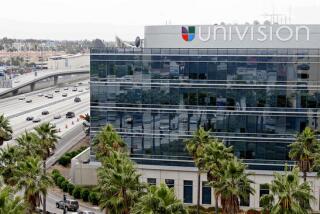Mexico Bank Ties Raise Question of Merger
- Share via
A joint venture by Mexico’s two biggest banks to combine operational tasks like managing cash machines has inevitably raised the specter of a banking mega merger to match the sweeping global trend.
But many analysts--though by no means all--said a full-blown alliance between Grupo Fianaciero Bancomer and Banamex-Accival (Banacci) would face insurmountable political obstacles because between them, they would control nearly half the deposits in Mexico.
“This offers a tremendous opportunity for cost cutting,” said Carlos Gomez Lopez, banking analyst at Credit Suisse First Boston in New York. “But I don’t believe there will be a merger because the authorities would be very much against it.”
On Thursday, the two institutions said they signed an accord “to explore ways to take advantage of joint operating synergies and technology.”
Heading off the usual images of fusion associated with the term “synergies,” the banks insisted that they would not follow the recent wave of mergers in the United States and Europe and pledged to continue to compete vigorously.
Bancomer is Mexico’s largest bank in asset terms with 22% of deposits. It recently bought out Banca Promex, which has another 4% of deposits. Banamex holds 21% of total deposits, making a tidy total of 47%.
The banking giants said they planned to create a joint holding company to group together six new firms aimed at exploiting joint operations in areas such as check processing, managing cash machine networks and processing chip cards.
Two other firms would deal with credit cards and another would process mortgage business, the companies said.
Some analysts thought the alliance was what it seemed at face value--just a simple agreement to exploit economies of scale and outsource processing to a company they themselves could control. In addition, they could even make money renting out the company’s services to other banks.
The move could save tens of millions of dollars a year in administrative costs for the two banks. They are only now beginning to recover from the 1994-95 peso crisis, which sent interest rates and past-due loans sky-high.
Paul Warme of Paribas in New York noted that Bank of Montreal has a 16% minority stake in Bancomer. He said arrangements such as the one between Bancomer and Banacci were common in Canada and that Bank of Montreal may have suggested it.
“On the other hand, it may well be the first step in a move to a merger. The next roadblock is that they control 50% of the market, and that would have to be taken into consideration,” Warme said. “The question is, ‘Is it more important to have a strong financial system than a fair one?’ ”
Rafael Bello of Morgan Stanley in New York said the possibility exists that the two heavyweights--faced with capitalization needs and serious weakness in the domestic banking system--might indeed seek closer ties.
“The alliance is positive, “ he said.
Others could not see such a move taking place.
“It would be the most dominant bank that I know of,” said Jason Mollin of Dresdner Kleinwort Benson in New York. “I don’t think it’s going to happen. They are strong competitors.”
Analysts say Banamex may be holding out for a foreign partner once congress passes financial reforms that would allow foreign investors to buy out Mexico’s big three banks.
The process of those reforms moving through a Chamber of Deputies controlled for the first time in seven decades by opposition parties has been extremely slow, hampered by a controversy over turning into public debt the $60-billion cost of bailing out the banking sector after the peso crash.
More to Read
Sign up for Essential California
The most important California stories and recommendations in your inbox every morning.
You may occasionally receive promotional content from the Los Angeles Times.













